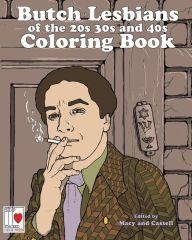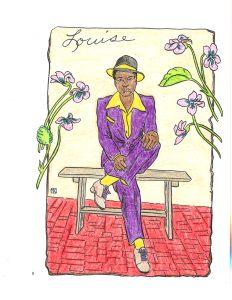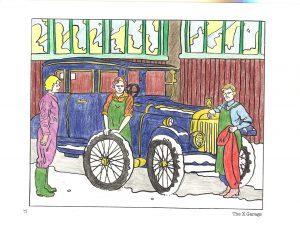
From the publisher of The Queer Heroes Coloring Book (featuring a delightfully bedecked Edward Gorey on the cover) comes Butch Lesbians of the 20s 30s and 40s: Coloring Book, a collection of performers, mechanics, millionaires, and unknowns, from the 1920s through the 1940s. Nineteen artists, including Maia Kobabe (Louise), Avery Cassell, and Jon Macy (X Garage), bring these figures to life. The expressive takes on famous photographs and persons allow you to fill in each image with your own technicolor sensibilities, as well as fill in gaps in your own knowledge of queer history. The more time you spend with the woman or women on the page, carefully selecting just the right shade of purple for a suit jacket, the more time you end up spending thinking about who it is you're looking at. Who is this defiant individual gazing back at me from a mugshot? What does it mean to find community in a public place, yet remain anonymous to history? I love the assortment of intimate moments between couples; the affability and charm exuded in solo portraits, coming across more as a conversation between the subject and the viewer; and the moments that project calm or exhilaration, and everything emotion in between. In the foreword, Sasha T. Goldberg, offers up her thoughts on butch identity and history. Goldberg acknowledges that the lens of experience and parameters through which she sees this collection and the identities of its subjects, may differ from yours.

Biographies of known persons and historical context for unknown persons, found at the back of the book, provide this collection with extra heft. A few of the images were familiar to me during my own readings of the eras covered here, such as thrill seeking heiress Joe Carstairs and the X Garage she ran with friends following WWI; night club performers, Gladys Bentley and Buddy Kent; and writers Djuna Barnes, Willa Cather, and Radclyffe Hall. There are a few historical figures that I'm unsure about, though, regarding their inclusion as butch lesbians. For instance, I haven't found information about Bessie Coleman's sexual preferences, though I admit I don't know much about her aside from tales of her aviation prowess. The collection could also benefit from the addition of a book list for further reading. Readers and colorists will better connect with the writers' and artists' intentions of honoring these women.

I had a lot of fun (and plenty of hand cramps and that red indent on my ring finger) coloring in Louise and the X Garage crew. Coloring books for adults are seeing a surge in renewed interest, popping up as library programs, meditative exercises, and small gatherings. Does your book club need an excuse to spend afternoons coloring and discussing art and history? The end of the coloring book includes three discussion questions from Ajuan Mance about gender, how artistic visions influence a viewer's interpretation.
I've included a list of titles if you'd like to learn more about these women's lives or want a more general context of what life was like for queer people during the 1920s-1940s. The list is by no mean comprehensive and the asterisked titles reside on my TBR shelf. You can help grow this list by adding suggestions in the comments below.
Further Reading:

